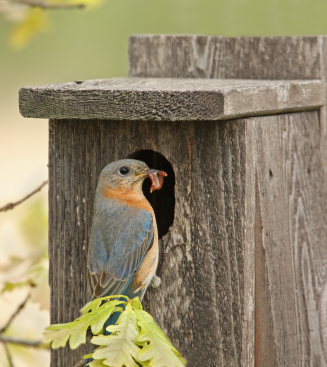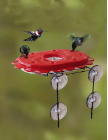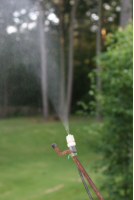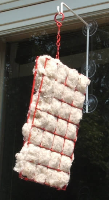-
Time to Clean Out & Repair Bluebird Houses
If you have the dreaded spring cleaning blues, just step outside and switch to spring cleaning your bluebird houses. Now’s the time when males start trying to lure females to the best, and most beautiful house in which they’ll raise their brood.
Clean out old nests, and discard the nest materials away from the house so as not to attract predators. It’s best to scrub the inside with a mild bleach solution as well, (1:10) to kill any infestations, bacteria or molds. Rinse well and let air dry before putting the house back.
Wooden bluebird houses may appear rough around the edges, especially at the entrance…a usual sign of squirrel damage. Don’t fret though, the house is likely still usable. Just add a metal portal, or protector over the existing entrance. They’re inexpensive and work well to repair bluebird houses.
If you’ve just put up your first bluebird house, and are hoping to attract these wonderful birds – try adding live meal worms to your feeding regimen. They really do magically attract bluebirds. A Bird bath with fresh water is helpful too. Our eastern bluebirds braved the harsh winter here in North Georgia as the heated baths, suet and live worms kept them fat and happy. Just know that when feeding live worms, most birds will literally eat you out of house and home, which is why a bluebird feeder works best. The bird must pass through an entrance hole to get the worms. Very few birds, besides bluebirds will do this.
Happy Spring and Happy Birding!
- Bird Accessories, Bird Nesting Materials, Hummingbird Feeders, Misters and Birdbath Drippers, Nesting Material, Uncategorized, Window Hummingbird Feeder
Add More to Your Window Hummingbird Feeder
It’s a known fact that hummingbirds practice site fidelity – if they find great accommodations, there’s a very good chance they’ll return the following season. If you love watching the tiny sprites and have window hummingbird feeders or hanging ones, there’s a couple more things you can offer to accommodate more hummingbirds, and keep them coming back.
They love water, and if it’s moving water – even better! Birdbath accessories like fountains and drippers act like a magnet for hummingbirds. I think the leaf misters might just be their favorite. The way they dance, back and forth to play and bathe in the fine mist is mesmerizing. I could sit and observe for hours if there were time. We have two misters, one is upright, staked in the ground, wrapped around a simple green plant stake with a twistie to hold the nozzle in place. The other is up higher, and more horizontal, off the front porch railing, attached to a metal bracket. They really love these things!
Another wonderful accessory (actually endorsed by The Hummingbird Society) is Hummer Helper Nesting Material. It’s a kit with a hanging, red flat basket, and nest material. Goldfinches use this material as well to build their nests. The good thing with the kit is that refills are also sold separately. Our kit saw a lot of activity last season, but I never could figure out where the nests were?
-
American Humane Seeks Kindest Kids for National Contest
During Be Kind to Animals Week®
Winners Will Be Awarded $1,000 — Entry Deadline: April 15, 2010
DENVER, March 15, 2010 – The American Humane Association’s Be Kind to Animals Week® has been celebrated since 1915, and the highlight of this annual observance is the Be Kind to Animals™ Kid Contest, which recognizes children and teens who show extraordinary kindness to animals and go out of their way to help them.
Nominations for two age groups, 6-12 years old and 13-17 years old, will be accepted through April 15, 2010. In each age group, the grand prize winner will receive $1,000 and the runner-up will receive $500. Winners will be announced during Be Kind to Animals Week, May 2-8, 2010. Contest rules and nomination forms are available at www.americanhumane.org/bkaw.
Last year, Annie Lee Vankleeck, of Shokan, N.Y, was the grand prize winner in the category for 6- to 12-year-olds. She showed kindness to animals by collecting used blankets and towels for shelter dogs, including going to yard sales and persuading people to donate their blankets — or buying them from the people — as well as collecting blankets and towels at school. Annie’s actions, and the actions of every young humanitarian, clearly demonstrate compassion, the power of the human-animal bond, and the importance of animals in people’s lives.
Want to make a difference?
Here are ideas for celebrating the human-animal bond – both during Be Kind to Animals Week and throughout the entire year:
- Speak out for animals. Get active in local animal welfare policies and legislation. Also register on American Humane’s website at www.americanhumane.org to receive timely Action Alerts about issues affecting animals. You’ll be able to make a difference for animals with just the click of your mouse.
- Share kindness. Teach the people in your life – especially children – about the importance of being kind to animals.
- Identify your pets. Make sure your pets have current tags and are microchipped so they can be returned home quickly if they become lost.
- Make a donation to your local animal shelter. A donation can be any number of contributions, from your time or money, to needed items such as pet food or laundry detergent.
- Appreciate wildlife. Leave room in your yard for natural habitats, like a pond for fish or a birdhouse.
- Report animal abuse. While acts of violence against animals are tragic in their own right, they are also a red flag for other violent behavior, including domestic abuse and violent crime.
- Educate yourself about The Link® between violence to animals and violence to people to help stop the cycle of violence. When animals in a home are abused or neglected, it is a warning sign that others in the household may not be safe, and children who witness animal abuse are at a greater risk of becoming abusers themselves.
- Adopt a pet from a shelter or breed-rescue group. Local shelters and rescue groups are the best place to find companion animals – no matter what type you’re looking for. Keep in mind that one out of every four dogs in shelters is a purebred.
- Help end the tragedy of euthanasia of adoptable animals by not contributing to the pet overpopulation problem. If you have pets, make sure to have them spayed or neutered.
Find us on Twitter at www.twitter.com/americanhumane and on Facebook at www.facebook.com/americanhumane. The information contained in this release may be reused and posted with proper credit given to the American Humane Association.
About American Humane
Founded in 1877, the American Humane Association is the only national organization dedicated to protecting both children and animals. Through a network of child and animal protection agencies and individuals, American Humane develops policies, legislation, curricula and training programs to protect children and animals from abuse, neglect and exploitation. The nonprofit organization, headquartered in Denver, raises awareness about The Link® between violence to people and violence to animals, as well as the benefits derived from the human-animal bond. American Humane’s office in Los Angeles is the authority behind the “No Animals Were Harmed”® end-credit disclaimer on film and TV productions, and American Humane’s office in Washington, D.C., is an advocate for child and animal protection at the federal and state levels. The American Humane® Certified farm animal program is the nation’s original independent certification and labeling program for humanely raised food. American Humane meets the strong, comprehensive standards of the Better Business Bureau’s Wise Giving Alliance, has been awarded the Independent Charities of America’s “Best in America” Seal of Approval, has met the stringent standards for financial efficiency and accountability required by the American Institute of Philanthropy to qualify as a Top-Rated Charity, and has received a 3-star rating from Charity Navigator, America’s premier independent charity evaluator. Visit www.americanhumane.org to learn more.





